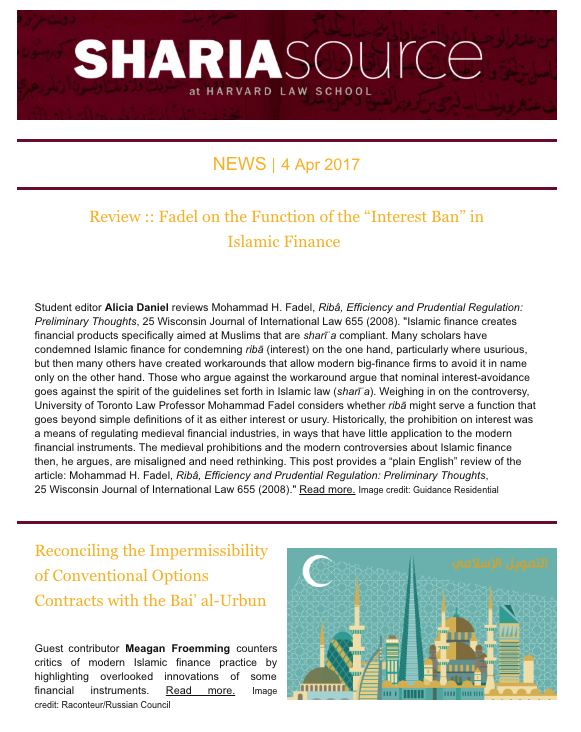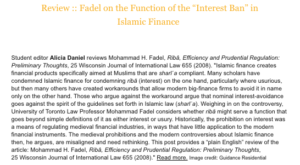
 Review :: Fadel on the Function of the “Interest Ban” in Islamic Finance Student editor Alicia Daniel reviews Mohammad H. Fadel, Ribâ, Efficiency and Prudential Regulation: Preliminary Thoughts, 25 Wisconsin Journal of International Law 655 (2008). “Islamic finance creates financial products specifically aimed at Muslims that are sharīʿa compliant. Many scholars have condemned Islamic finance for condemning ribā (interest) on the one hand, particularly where usurious, but then many others have created workarounds that allow modern big-finance firms to avoid it in name only on the other hand. Those who argue against the workaround argue that nominal interest-avoidance goes against the spirit of the guidelines set forth in Islamic law (sharīʿa). Weighing in on the controversy, University of Toronto Law Professor Mohammad Fadel considers whether ribā might serve a function that goes beyond simple definitions of it as either interest or usury. Historically, the prohibition on interest was a means of regulating medieval financial industries, in ways that have little application to the modern financial instruments. The medieval prohibitions and the modern controversies about Islamic finance then, he argues, are misaligned and need rethinking. This post provides a “plain English” review of the article: Mohammad H. Fadel, Ribâ, Efficiency and Prudential Regulation: Preliminary Thoughts, 25 Wisconsin Journal of International Law 655 (2008).” Read more. Image Credit: SHARIAsource
Review :: Fadel on the Function of the “Interest Ban” in Islamic Finance Student editor Alicia Daniel reviews Mohammad H. Fadel, Ribâ, Efficiency and Prudential Regulation: Preliminary Thoughts, 25 Wisconsin Journal of International Law 655 (2008). “Islamic finance creates financial products specifically aimed at Muslims that are sharīʿa compliant. Many scholars have condemned Islamic finance for condemning ribā (interest) on the one hand, particularly where usurious, but then many others have created workarounds that allow modern big-finance firms to avoid it in name only on the other hand. Those who argue against the workaround argue that nominal interest-avoidance goes against the spirit of the guidelines set forth in Islamic law (sharīʿa). Weighing in on the controversy, University of Toronto Law Professor Mohammad Fadel considers whether ribā might serve a function that goes beyond simple definitions of it as either interest or usury. Historically, the prohibition on interest was a means of regulating medieval financial industries, in ways that have little application to the modern financial instruments. The medieval prohibitions and the modern controversies about Islamic finance then, he argues, are misaligned and need rethinking. This post provides a “plain English” review of the article: Mohammad H. Fadel, Ribâ, Efficiency and Prudential Regulation: Preliminary Thoughts, 25 Wisconsin Journal of International Law 655 (2008).” Read more. Image Credit: SHARIAsource
 Reconciling the Impermissibility of Conventional Options Contracts with the Bai’ al-Urbun Guest contributor Meagan Froemming counters critics of modern Islamic finance practice by highlighting overlooked innovations of some financial instruments. Read more. Image credit: Raconteur/Russian Council
Reconciling the Impermissibility of Conventional Options Contracts with the Bai’ al-Urbun Guest contributor Meagan Froemming counters critics of modern Islamic finance practice by highlighting overlooked innovations of some financial instruments. Read more. Image credit: Raconteur/Russian Council
 Islamic Law in U.S. Courts: Vinewood Capital v. Dar al-Maal al-Islami Trust (5th Cir. 2008) This case examines a mudaraba agreement signed in Texas, and whether its signatories are subject to its arbitration clause when the signatories have also signed a prior contract. This is part of SHARIAsource’s Islamic Law in U.S. Courts series. Read more. Image credit: United States Supreme Court
Islamic Law in U.S. Courts: Vinewood Capital v. Dar al-Maal al-Islami Trust (5th Cir. 2008) This case examines a mudaraba agreement signed in Texas, and whether its signatories are subject to its arbitration clause when the signatories have also signed a prior contract. This is part of SHARIAsource’s Islamic Law in U.S. Courts series. Read more. Image credit: United States Supreme Court
See the full newsletter.

